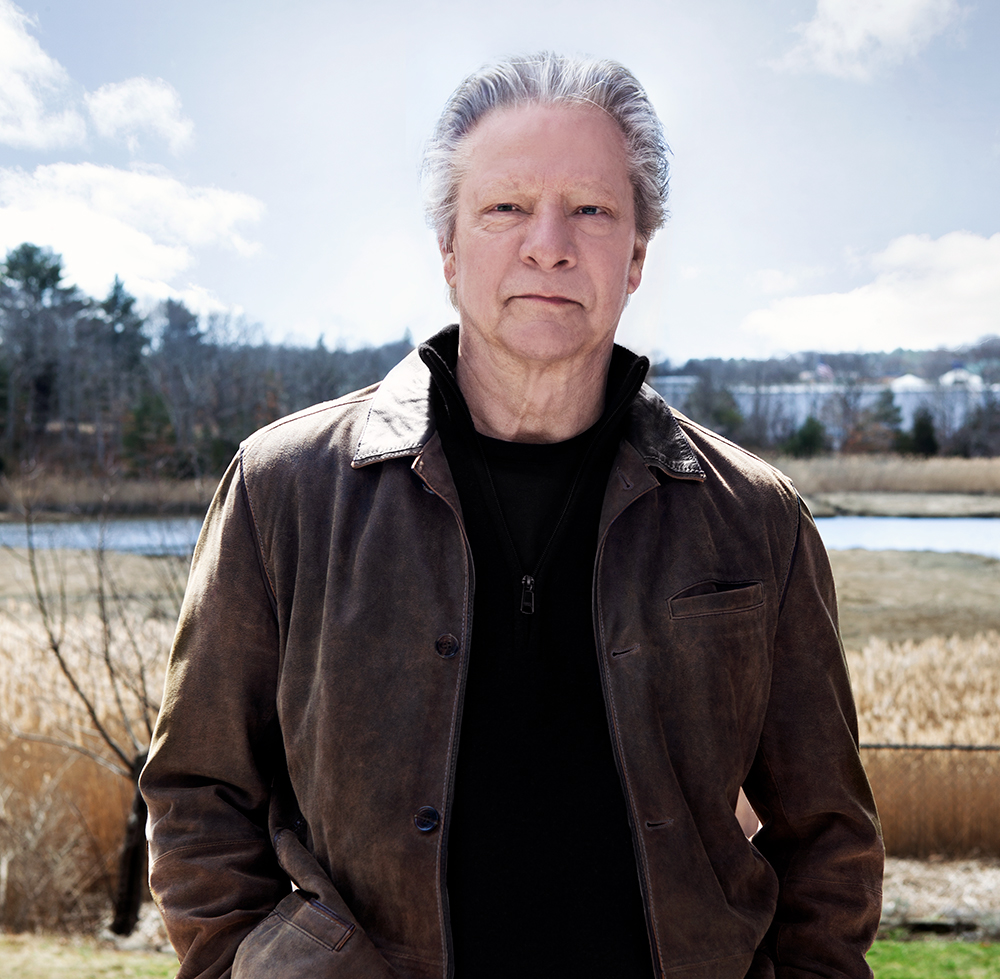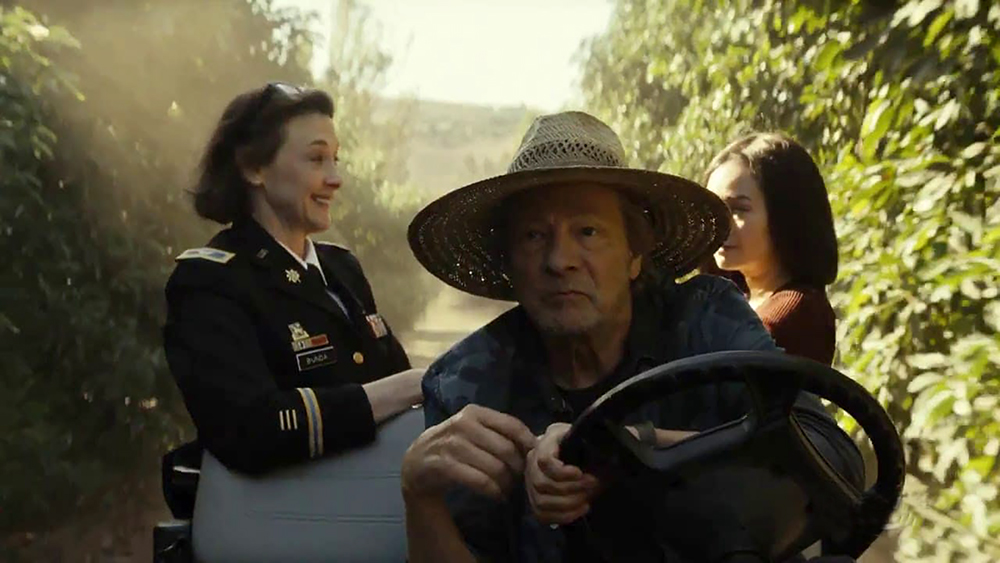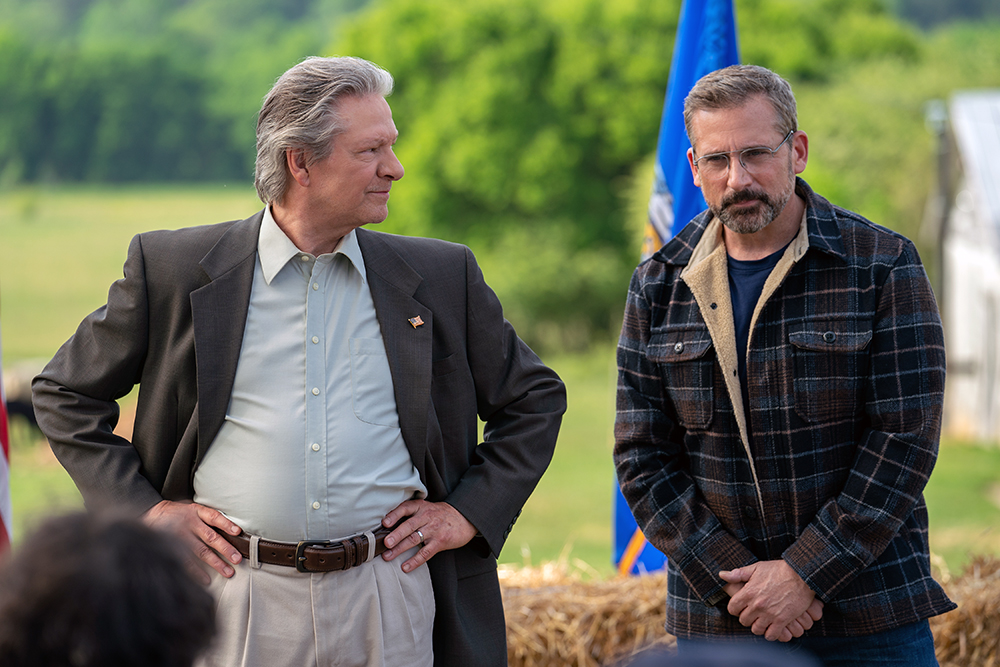
Chris Cooper is a classically trained actor—and seemingly serious to a fault given the sort of intense, dramatic roles for which he’s known. So when the Kansas City native—and Academy Award winner—was anything but stern during a 40-minute conversation from his home near Plymouth, Massachusetts, it was pause-worthy.
The actor happily kibitzed on everything from his early start in local metro theater troupes to his stint at Mizzou to his first big break to being quarantined. Normally, celebrity interviews are polite verbal volley. This was an Olympic ping-pong match of Q&A, and Cooper was far more candid, chatty, and clever than the authoritative personas he readily portrays.
Cooper has two new projects out, including Amazon Prime’s second season of the psychological thriller Homecoming and the upcoming political satire Irresistible, written and directed by Jon Stewart. (Yes, you read that right. Cooper is starring in a comedy.) Homecoming is available now, and Irresistible is streaming on VOD beginning June 26. He says after an insane acting schedule last year, the recent pandemic downtime has done him good. Plus, he’s way, way ahead of all the projects he likes to do around the house.
First of all, how are you?
Really good. My wife and I have been hunkering down and taking things seriously. I have such a jump on spring cleaning. I am way ahead of the game. I have a list as long as my arm of things to do and I’m working through them while I’m home. There’s some good to it.
Did your wife Marianne give you a honey-do list or are you keeping yourself busy?
No, I really enjoy this stuff. I’m actually the guy who cleans up the house anyway. There’s so much outdoor work and getting the yard ready. I just opened the pool. Just getting things really in shape and enjoying it. I love to do it. I’m learning to garden and really enjoying it. When I lived in Kansas City, my dad and I raised cattle so that was a real big part—outdoor life. I just loved it. Working the ranch was very, very physical, and I loved it.
I want to know more about your days growing up in Kansas City. What were your stomping grounds?
My stomping grounds were primarily in Brookside and Waldo and Westport. [pause] Well, and the Plaza. We did a big circle. I was born in Kansas City—and everybody for generations on both sides of the family were from Texas—so we went back down to Texas where Dad was going to continue his medical practice. He had just done his internship and residency in Kansas City. We stayed there about a year, but a doctor who was wanting to retire in Kansas City approached Dad for a partnership. It scared Dad to death to take on this other doctor’s practice, he didn’t know if he was ready. Mom adored her mom and dad who were in Houston and was afraid to leave them, but she knew if Dad took on this practice, he’d be ten years ahead in his career, because he’d already have all these patients in place. So we moved back to Kansas City—and at that time, I was about five and about to go into kindergarten at Border Star.
Do you still have family in town?
I lost my mother four or five years ago, but I do have a nephew who lives in Lee’s Summit.
“Kansas City was the perfect place to grow up. I had a glorious childhood. It couldn’t have been better.”
What is your fondest memory of KC?
Because we just had a 50th high school reunion, it brought to mind that I’ve grown up with all these kids since kindergarten all the way through high school. I had some wonderful, wonderful friends and girlfriends. Kansas City was the perfect place to grow up. I had a glorious childhood. It couldn’t have been better.
You got bitten by the theater bug when you were in high school—but it was all behind-the-scenes. Tell us about that.
I was probably 16, 17, 18, and my friends were getting into a bit of petty crime here and there, and it was kind of freaking me out. I began to separate myself from some of the kids I hung out with. Along with that, fortunately, I knew where my love of theater was. In the summer, I went over to Prairie Village—back then in the ’60s, there was a community theater called Barn Players Theater—I walked into that theater and talked to the artistic director and I said I will do anything, anything. I’ll work for free—if you need anything theater-wise that I can do. So it was a great foundation. From sweeping the aisles to standing in the wings watching productions as a scene shifter and then working my way back to the workshop and building and designing sets.
The artistic director was kind enough to let me know the Jewish Community Center had another theater that some grad students were going to take over for the summer and asked if I would like to be the shop foreman to build the set. The production was Tennessee Williams’ A Streetcar Named Desire. Remember Tom Berenger? He’s done lots of military movies. Anyway, he was cast as the newsboy that comes in in the second act. And Tom missed one of the matinees. So I had to step in real quick and learn the lines within an hour and go on stage. That was my first step onto the stage. And then I got serious about it—went to the University of Missouri in Columbia where I had some wonderful teachers and productions.

What was your degree in?
It was a general studies degree. It was primarily for Vietnam vets who—if you could convince the powers that be that you knew what line of work you wanted to go into—you could more or less create your own curriculum. I knew where I was headed and I just loaded up on everything—history, English and everything I could connect to theater.
There was a woman’s college right next door to MU, Stephens College. MU had no dance to offer and Stephen’s had jazz, ballet, East Indian dancing—so I got classes over there, which was pretty wonderful because in one respect I was a pretty shy guy and all this theater brought me out. What I’m getting at is one of the greatest things that ever happened to me in terms of busting loose was to take a class over at Stephens and be one of only three men in a class of 40 beautiful, young women and making a fool of myself in every dance class in front of these women. It was just the best thing that could ever happen to me.
So, you’re a double threat. But can you sing?
Oh, I originally wanted to be a lounge lizard. My folks took me on a trip to Las Vegas when I was about 14 or 15, and we stayed at the Desert Inn Hotel. I thought it was so cool—so mature and hip. I saw a lot of lounge shows. I loved to sing anyway—I was in the choir. I would sing every opportunity I could—church choir, the high school choir, state competitions. In that choir there was a male octet and I was one of the baritones. And I sang in a band.
This is new material. You are, indeed, a triple threat. Actor, dancer, and singer! What do you consider to be your first “big break” in the biz?
It’s gotta be a play. I tell you what, when I moved to New York, I took classes with one of the great acting coaches, Wynn Handman, a disciple of The Neighborhood Playhouse. Within class, there was a big grapevine of information that I was totally unaware of. I found out that during springtime all the regional artistic directors would come to New York and audition actors for their following season. And, man, I just hit it right. Jon Jory, of Actor’s Theatre Louisville—in ’79 or ’80—set up an audition for me to read with him. I got several seasons of work there. The Actor’s Theater Louisville had a great literary department and lots of productions. While we were there, we would do one-act festivals where all of New York’s agents and managers would come down to look at the new meat to see if they wanted to hire them.
Let’s talk about your two new projects—the Amazon Prime series, Homecoming and the Jon Stewart film, Irresistible. I have so many questions because they are both so wildly different roles. First of all—without giving too much away for folks who haven’t seen it—in Homecoming you play Leonard Geist, who sort of reluctantly created a biomedical product that takes on a life of its own. Tell me about your character. Was it based on anyone?
No, no—it was totally, totally fiction. But we hoped the introduction of Leonard Geist would be interesting to the viewer. You’re led to believe that he’s a heavy corporate type who runs this institution that started out selling cleansers, detergents, and soaps. When he went back to Vietnam—he was a Vietnam vet—he found this certain berry which had great potential. He’s part scientist, part farmer, and part herbalist. He’s developed this berry to be used in many ways and in different quantities for said purposes. But he’s kind of an old hippie and he’d rather be out in the field developing these berries than be in the office. And from the first season, he has not kept his eye on the office, so some higher-up underlings have taken over and used this product in a pretty wicked way.
Your co-star is Janelle Monae, who hails from KCK. Even though you are in maybe one brief scene together, please tell me that off-camera you two kibitzed about growing up in Cowtown.
We didn’t, we didn’t. It’s weird. You imagine folks hang out and have a lot of free time. We were under the gun and working easily 12- to 14-hour days and I have to say—in the best way—Janelle is kind of new to the business, so she was super serious about her portrayal and her character and she had a lot on her shoulders. I’m very aware of what actors go through. It was my point not to bug her and stay out of her way. I let her do her work because I could see she had a lot of responsibility headlining this second season. So we didn’t spend a lot of time together at all—other than ‘Good morning, how you doin’?’ That was it.
Duly noted. Now in Irresistible, you shift gears—substantially. I think I saw you smile and laugh more in this movie than your last dozen movies combined.
It’s true. [laughs] I shocked myself when I saw it the first time. And now people know, ‘Oh, he does have teeth.’
Is it a comedy? A drama-dy?
It’s a light, smart little comedy. Not heavily political. Jon [Stewart] had some points that he wanted to put out there for the viewing audience. If folks are familiar with Jon’s signature brand of comedy, then it’s certainly in this [movie]. It was wonderful to act with Steve Carell, and it was really interesting to see how those two guys worked together. It was good to be a little distance away from them as they were setting up lights and cameras. As we were going to shoot a scene, Jon and Steve would still be working on the script. They would trim and get to the nut of the comedy. It was a light, but serious conversation. That was unusual to the usual way of working. They’d be trimming just before we’d shoot. They’d shoot the scene as scripted and then let Steve Carell loose to improv or add any bits of comedy he wanted. My hat is off to him. That’s a whole talent I know nothing about. It was terrific to watch it happen.

It’s a sharp satire of the political scene where you play a former marine colonel and now farmer who’s thrust into the political spotlight. Did you go after this role or did Jon Stewart come after you?
Let’s see, as I remember—I was told about it. I got a look at the script and thought it was a no-brainer. I thought it was a great, fun piece to do. And then Jon and I talked over the phone. We had a 25-minute conversation. We talked over the script and he said, ‘Well, we’ll see what happens.’ And then three to four days down the road, I found out he wanted to cast me.
Wait, wait, wait! Does this mean we’re going to see you in more comedies? Maybe?
My wife and I have always brought up the fact that the one film I got the most recognition for—Adaptation, I won the Academy Award and all that business—was the closest I had come to a dry kind of humor. It’s funny, I rarely get approached for stuff like that, but would love that if something came along, I’d love to try and play more comedy.
Little Women is recently out on digital. How was shooting a pitch-perfect period piece?
It was pretty remarkable. I was also working with Tom Hanks on A Beautiful Day in the Neighborhood. Both were Sony productions and the production offices worked it out so that I finished in Pittsburgh with A Beautiful Day at midnight. They then drove me to the airport and Sony sent a Learjet to pick me up and six hours later, I’m in period costume and mutton chops shooting the biggest scene I had in Little Women. It was a tight fit but worked really well. It was like those actors who live in LA and just drive to work. I loved it being shot here in Massachusetts.
You are truly the hardest working man in show business.
I’m busy. It was a great, busy year. But with this quarantine, I’m recuperating from it all.
I’ve been dying to ask …
Don’t do that.
[laughs] I’ve been dying to ask; do you enjoy going to award shows and events? And do you get starstruck?
Well, you can, sure. It’s a mix of things. The Golden Globes and the Oscars, back then that was a really exciting time, but it gets a little old after a while. I appreciate the recognition and you do get starstruck and there are people I feel so lucky I had the opportunity to walk up to them and tell them how much I appreciate their work. Half of its business—and half of it is a lot of fun.
Interview condensed and minimally edited for clarity.


